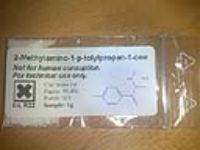Mephedrone to be classified a Class B drug
Mephedrone is to be made a Class B drug and banned within weeks, the Home Secretary has announced.
Mephedrone is to be made a Class B drug and banned within weeks, the Home Secretary has announced.
Immediate action being taken includes the banning of importation, health warnings and police will contact head shops and other suppliers warning them of the ban and what penalties they will incur if they ignore it.
The move comes after advice from the chair of the Advisory Council on the Misuse of Drugs (ACMD), Les Iverson, earlier this week that mephedrone and the family of cathinone derivatives are dangerous drugs and should be controlled under the Misuse of Drugs Act 1971 as Class B.
The ACMD expressed concern over the harms it can have, including hallucinations, blood circulation problems, rashes, anxiety, paranoia, fits and delusions. The drug, also known as M-CAT or Meow-Meow, has been linked to three deaths in recent weeks.
Home Secretary Alan Johnson said: I am determined to act swiftly on the ACMDs advice and will now seek cross-party support to ban mephedrone and its related compounds as soon as possible.
I am also taking immediate action to limit supply by banning the importation of mephedrone; sending clear warning to suppliers about their responsibilities; and using the Governments successful Frank campaign to warn young people about its dangers.
Association of Chief Police Officers (ACPO) lead on drugs, Chief Constable Tim Hollis, said: Given the recent public concern surrounding the death of young people who may have taken mephedrone, ACPO broadly welcomes the Governments decision to classify it as a Class B drug.
This decision sends out a clear message to young people that this is a dangerous and harmful drug and should not be taken. It will also serve to suppress sales and provide police with enforcement powers that will allow us to target those dealing in this drug.
ACPO has recently prepared guidance on the policing of new psychoactive substances to be circulated to all forces and mephedrone will now be included in that guidance. Our enforcement will initially concentrate on those people who sell and traffic this harmful drug rather than on the young people who we may find in possession of it. It is not our intention to criminalise young people.
The easy availability of this drug and its effects on those who have taken it has been a concern for many people and its new classification will, I am sure, provide a degree of reassurance that something is being done about it. It does not, however, solve what has become an increasingly complex issue and making something illegal does not stop it being sold, bought or consumed.
Police have an important role to play in reducing the harm of drugs within the community but we do not stand alone. Other agencies need to provide support in tackling this problem and young people themselves have responsibility for the choices they make when out enjoying themselves.
The Conservative Party said that the Labour Government has been slow to act in tackling mephedrone and if it was in power it would reform the drugs laws to respond to the growing problem of so-called legal highs to provide a speedier way to deal with public health issues linked to new substances.
The Tories have proposed introducing a new temporary drug classification which would apply for a maximum period of 12 months. The temporary classification would enable legal controls on sale and supply to be made where significant public health concerns have been highlighted about a new psychoactive substance, allowing time for expert input and analysis to be provided to inform decisions on whether a formal classification should be made or not, while addressing immediate public safety risks.
The party also says it would amend the drugs laws so that modified versions of existing controlled substances are captured within the framework of the Misuse of Drugs Act.
There were concerns earlier in the week that the resignation of senior drug ad


